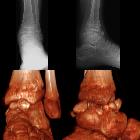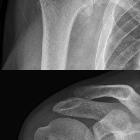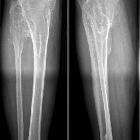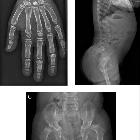Trevor disease






Dysplasia epiphysealis hemimelica (DEH), also known as Trevor disease, is an extremely rare, non-hereditary disease that is characterized by osteochondromas arising from the epiphyses.
Epidemiology
The incidence is estimated at ~1:1,000,000 . There is a recognized male predilection (M:F = 3:1). It usually presents in young children.
Pathology
Classification
Azouz et al. has proposed the following classification:
- classic form: characteristic hemimelic distribution involving more than one bone or epiphysis within a single lower extremity
- localized form: single bone affection unilateral or bilateral
- generalized form: involving the whole limb from pelvis to foot
Etiology
The etiology is uncertain but is thought to be congenital.
Location
- lower extremity is more common than upper extremity
- distal ends are more affected
- medial aspects are affected twice as commonly as lateral
- the distal femur is one of the most frequent sites
- other sites are around the ankle joint
Radiographic features
Radiograph
Typically shows an irregular mass with focal ossification arising from one side of the affected epiphysis . This can result in widening of the affected joint.
CT
Useful for assessing cortical continuity with the epiphysis.
MRI
MRI is useful for evaluation of underlying ligaments and cartilages. Osteochondral overgrowth signal intensity will be similar to normal epiphyseal cartilage and bone.
Treatment and prognosis
Surgical excision of mass with preservation of joint.
Complications
- fragmentation and detachment leading to intra-articular bony fragments
- deformation of the ligaments and tendons affecting the joint mechanism
- chronic tendonitis and tenosynovitis due to chronic irritation of tendons by mass or bony fragments
- development of secondary osteoarthritis of affected joint
History and etymology
After French surgeon Albert Mouchet (1869-1963) and Joseph Belot (1876-1953) were the first to describe the condition in 1926 , it was elaborated on by David Trevor (1906-1988), an English orthopedic surgeon from London . Later on, in 1956, Thomas John Fairbank (1912-1998) coined the name "dysplasia epiphysealis hemimelica" because of the medial or lateral half predisposition within a limb .
Siehe auch:
- Osteopoikilose
- kartilaginäre Exostose
- Arthrose
- Multiple kartilaginäre Exostosen
- Pigmentierte villonoduläre Synovialitis
- Chondrodysplasia punctata
- Multiple epiphysäre Dysplasie
- epiphyseale Dysplasien
und weiter:

 Assoziationen und Differentialdiagnosen zu Dysplasia epiphysealis hemimelica:
Assoziationen und Differentialdiagnosen zu Dysplasia epiphysealis hemimelica:







